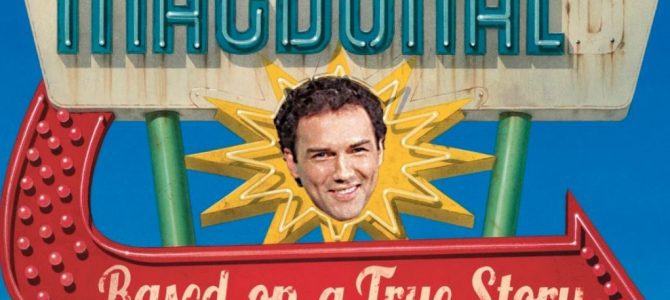
“Would you like to write a review of Norm Macdonald’s new book,” one of the big wigs at the Federalist asked me.
“I’d be happy to,” I replied, “but I’ve never written a book review before and I’m not sure how to do it.”
At this point said big wig unveiled the secret to writing a book review. “Read the book, then say what you liked and what you didn’t,” he told me. He then chastised me for not having sufficient faith in my ability to say what I did and didn’t like about a book. It was a good pep talk.
It was also a rather useless pep talk, because it’s not really possible to book-review Based On a True Story: A Memoir, since it’s not a book.
Many Book-Like Features
Don’t get me wrong, Macdonald’s first foray into the literary realm has many book-like features. It has pages with words on them. It has a dust jacket with the title on the front and endorsements on the back. It generally abides by the rules of English grammar, and features quotation marks, commas, and other forms of punctuation.
But in substance Based on a True Story is not a book. Books impart information to the reader or offer him a cathartic experience. Books fill the reader with knowledge or feelings, even if they are written by comedians. Steve Martin’s 2007 memoir Born Standing Up: A Comic’s Life, for example, did both of these things, as it told the reader who Martin was, where he come from, and what formed his approach to comedy while inviting readers to feel a sense of euphoric escape by entering the world of Martin’s absurdist humor.
Based on a True Story, however, does neither of these things. It doesn’t invite the reader to understand who the actual Norm Macdonald is, nor does it welcome the reader to find peace within the embrace of Macdonald’s comedic stylings. Rather, Based on a True Story invites readers to approach Macdonald only to get shoved away with a barrage of jokes once they get within reach. Would you like to know what Macdonald’s time at “Saturday Night Live” was like? Too bad. No exposé for you.
Instead, Macdonald coaxes you into his arms by describing his instant infatuation with fellow cast member Sarah Silverman, only to kick you in the stomach when he spends several chapters detailing the aftermath of his attempt to contract-murder Silverman’s love interest, SNL writer Dave Attell.
Would you appreciate learning something about comedy icon Rodney Dangerfield? Tough luck. After bidding you to come close and learn what their friendship taught him about Dangerfield’s hidden struggles, Macdonald shoves you to the ground when he informs you that the source of these hidden struggles was the comic’s inability to get respect from his fellow man—offering up a string of Dangerfield’s most famous “I don’t get no respect” jokes as evidence of this supposedly secret shame.
Setting You Up
Despite being labeled “a memoir,” Macdonald has no interest in writing a genuine account of his life’s events or allowing the reader to get near him. Rather, he’s firmly committed to amusing himself by irritating you into fits of guffaws, by staring you in the eye and effectively saying, “I’m setting you up right now. We both know you’re annoyed. But we also both know that I’m going to make you laugh and there’s nothing you can do about it.”
In other words, Macdonald is doing to readers what he has done so famously on talk shows and in other venues throughout his career. This is what makes Based on a True Story so ab-convulsingly hysterical and such a success as a book-that’s-not-really-a-book.
When Macdonald offers an even longer version of the moth joke that he made Conan O’Brien endure for more than four minutes, he invites you to be the flustered-yet-entranced talk show host. When he razes the “tell them what really happened with a few jokes thrown in” memoir template and spends an entire chapter chastising insult-comic legend Don Rickles for, you know, insulting people, he invites you to be one of the comics on the Roast of Bob Saget dais who spent three jokes thinking he was bombing before realizing he was dismantling the roast format with a series of harmless old-timey jabs that made his fellow comedians’ litany of F-bombs and filthy insults look tame by comparison.
Like with his standup and television appearances, Macdonald’s humor manifests itself in several ways throughout Based on a True Story. While some of these styles work better than others (I don’t, of course, endorse those where the author dives into a sea of blue humor), the lack of a consistent narrative style is part of the book’s charm. Macdonald is hilarious when he supposedly removes his ghost writer and secretary from involvement in the book and offers up his own unvarnished words that pound into the page with the incoherence and lunacy of an angry caveman.
He’s equally funny in the chapters where he skillfully employs a Tolstoyvian narrative style and spins a captivating tale of plunging into the frozen terrain of Newfoundland to fulfill a dying child’s horrifically unorthodox final wish. The only sense of consistency Macdonald offers is always referring to his personal assistant and foil Adam Eget by his full name—something that is undoubtedly funnier to Macdonald than it is to his reader, which, in the way of Andy Kaufman, ultimately makes it funnier to the reader.
Not Most Comedians
In a recent profile of Macdonald for the Washington Post, Geoff Edgers laments that SNL’s greatest Weekend Update anchor is generally absent from the airwaves. Edgers notes that even Comedy Central president Kent Alderman, a man with the power to give people television shows, wonders why Norm doesn’t have a television show. The answer, Edgers seems to suggest throughout his piece, is that Macdonald’s impossible-to-contain style and persona doesn’t fit cleanly into any branch of broadcasting.
But while most comedians benefit from the focus that a specific format provides, Norm Macdonald is not most comedians. If Based on a True Story proves anything, it’s that Macdonald fits best when he refuses to fit snugly with the confines of a genre or medium and just does whatever he wants. Macdonald was supposed to write a memoir. He refused, and it was the funniest memoir I’ve ever read. Macdonald was given the opportunity to write a book. He wrote something else entirely, a 237-page exercise in antagonizing his readers, and I enjoyed it far more than the results from other comics who followed the rules.
So if the only thing keeping Macdonald from having his own program is the idea that he wouldn’t work as a talk show host or as the lead on a sitcom, I would implore the television powers-that-be to remember that categories are for the little comedians. Macdonald is different. Give the man a camera and a decent budget. Let him do whatever he thinks is going to be funny. It will be.









